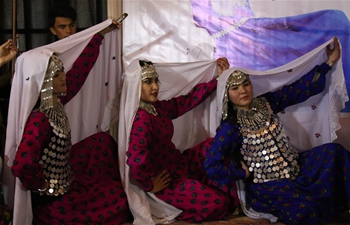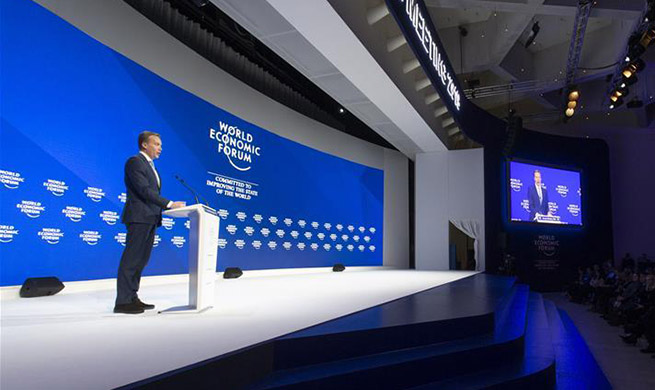GAZA, Jan. 25 (Xinhua) -- Mahdi Karira, a 39-year-old Palestinian from the Gaza Strip, is a master at making the marionette, who hopes to promote the art of puppet theater in the coastal enclave.
Karira makes the puppets and dolls on a small table in the balcony of his home in Gaza City. Each has its shape, name and distinguishing features.
All his attention to the marionette making started eight years ago, driven by his love for the puppet theater of Egypt, such as Bouji and Tamtam, Sesame Street and Operetta.
"Marionette is the most difficult type of dolls," Karira, a father of six children, told Xinhua.
He explained that when a puppet is finished, all joints must be movable by strings attached to a piece of wood at the top.
To make a marionette, Karira forms the puppet's head and body first and then sculpts the face befitting the character.
He later softens the head and body, makes the hands and fixes the hair, eyes and clothes.
In the last step, Karira connects the strings in the joints of the puppet so that he can easily move it.
Puppetry is an ancient form of performance that was used in Egypt as early as 2000 BC when string-operated figures of wood were manipulated to perform the action of kneading bread and other string-controlled objects.
This performance requires the human manipulation of puppets, a kind of inanimate objects that often resemble some types of human or animal figures.
The puppeteer uses their hands, arms or control devices such as rods or strings to move the body, head, limbs, and in some cases, the mouth and eyes of the puppet, while often speaking in the voice of the character of the puppet.
The actions, gestures and spoken parts by the puppets are typically used in storytelling.
The main purpose of a marionette play is to offer fun and entertainment to all people, regardless of age. It is simultaneously a perfect means of children's education.
"More strings mean more difficulties to move the puppet," Karira said as he fixed strings in one of the puppets he recently made.
Karira, a holder of Bachelor's degree in commerce and economics, developed his skills in making puppets through videos on social networking sites. He also has contacts with puppet makers from the West Bank, Egypt and Tunisia.
Notably, the Palestinian master also writes songs and scripts for shows displayed in civil society organizations in Gaza.
There is no specialized theater for children in the Gaza Strip, where limited activities, including puppet shows, are organized by local institutions.
"We do not have a specialized puppet theater in Gaza. Gaza has no marionette makers at all," he said sadly, adding that the Gazans do not have the culture of buying tickets for puppet performances.
"Yet, I still try to promote this art through limited occasions," said Karira, who uploads all his works on his own YouTube channel.
Karira believes the puppet theater is capable of dealing with many issues politically, socially and culturally, or any other issues related to human rights.
"People of Gaza need to smile, laugh and have hope amid the daily sufferings they have been going through for decades," he said.

















